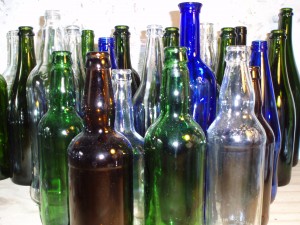
Why use bottles?
I love glass bottles – the variety of shapes, colours and sizes is almost limitless. They have been with us for a very long time (since around 100 BC) and, I hope, will stay for a while longer. Bottles are a part of all our lives. We all drink something – water, juice, wine, beer, vodka, whisky, gin… Whatever your libation of choice is, it most likely comes in a glass bottle. We drink the contents and discard the containers, and that’s how it goes. I like giving these lovely bottles a new lease on life.
When I was growing up bottles were recycled. We took them to the bottle bank and got paid for returning them into circulation.
These days, glass bottles and jars go into recycling banks – those that don’t end up by the roadside. The UK recycles 50% of glass containers, which is quite low compared to other European countries. For example, Switzerland and Finland recycle more than 90% of their glass.
Once collected, the glass containers get crushed, cleaned up, mixed into raw materials for new glass. They are then melted down and blown into new bottles or processed into other glass-based products, such as insulation. Some of the glass aggregate gets used in other ways, for example by adding it to tarmac to enhance the durability of road surface.
Why recycle glass?
- Glass manufacture has environmental impacts:
- use of natural resources (silica, soda ash, limestone and various additives to affect colour and other properties)
- use of energy
- pollution
- Glass is 100% recyclable and can be reprocessed infinite number of times without any deterioration in quality
- Taking part in recycling the waste we produce makes us think about the effect we are having on our environment and enables us to contribute towards a greater level of sustainability
- Recycled glass generates 20% less air pollution and 50% less water pollution (NASA)
- A ton of glass produced from raw materials creates 384 pounds of mining waste (British Glass)
- 345 kwh of energy is saved for every recycled tonne used (British Glass)
- 225 kg of CO2 is saved for every recycled tonne used (British Glass)
- 2 tonnes of raw materials quarrying are saved for every recycled tonne used -1,330 pounds of sand, 433 pounds of soda ash, 433 pounds of limestone, and 151 pounds of feldspar (British Glass)
Come on an eco-journey with us
Environment is important to me and my family. We grow our own food, love Cumbrian hills, fuse bottles to create something new and exciting and try to leave as light a footprint as possible in the process. If nature and individuality are important to you, I invite you to browse in our online shop and see if anything tickles your fancy.
